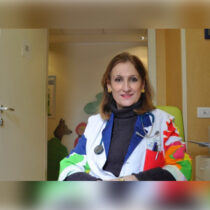AOU Meyer – Florence
Area of expertise and the Healthcare Provider’s contribution to care for patients within the MetabERN Network
Meyer Children’s Hospital is an official member of the European Network of Health Promoting Hospitals of the World Health Organisation. Founded in 1884, the Hospital was one of the first medical institutions in Italy exclusively devoted to child health care from birth to adolescence. The original structure has subsequently been enlarged to house the numerous additional services which have been activsted over the years. In 1995, Meyer’s Hospital, along with the Department of Pediatrics of the University of Florence, due to recognition of its role as a highly specialised paediatric institution, became an independent health institution of the National Health System. Many of the hospitals’ services have been identified as specialised referral units for the Tuscany region.
The metabolic Unit represents reference center for diagnosis, treatment and follow up for Inborn Error of Metabolism in pediatric and adult age. The patients come from Tuscany region and other Italian regions.
Metabolic Unit comprises:
- Clinical Unit for neonatal screening
- In Tuscany Expanded NBS is mandatory since November 2004
- From 2010 we perform NBS in Umbria Region, too
- Up to day 500000 newborns are screened by MS/MS and 1:1800 has been demonstrated affected by metabolic diseases
- We screen about 40 disease: aminoacidopathies, organic acidurias, beta oxidation disorders and urea cycle defects
- Currently a pilot project of newborn screening for lysosomal disorders (Pompe disease, Fabry disease and MPS1) is underway
Multidisciplinary team allows the care of newborns, children, adult patients with Inborn Error of Metabolism. There is a dedicated team of metabolic specialists H24, in holidays also.
Intensive care unit and nephrology team allow extracorporeal detoxification.
A specialized metabolic laboratory is able to perform urgent investigations within few hours if necessary (H24).
Our team, consisting of physicians specialized in pediatrics or neonatology with specific expertise in metabolic disorders, nursing staff, dieticians, psychologists, biologists, chemical pharmacologist, take care of hundreds patients with different types of inherited metabolic diseases, every year.
Our experience and multidisciplinary team allow to perform diagnosis and start therapy promptly.
Our team accompanies the patient into adulthood. Adult patients with inherited metabolic disease tend to fall into one of two groups:
- Those who presented in childhood and have been successfully managed by paediatric services and then transferred to the adult clinic
- Those who present for the first time in adulthood
Management is focused on preventing progression of disease and/or acute metabolic decompensation, long-term complications with an overall aim of helping an adult to live with a chronic condition.
The transition is a gradual process and takes place at AOU Careggi, the biggest hospital in Florence, located next located next to Meyer Children Hospital.
specific treatments and interventions provided by the HCP
Specific therapy for inherited metabolic diseases are provided as dietary intervention (i.e. protein or lipids dietetic restriction, aminoacids or vitamin supplementations), specific drugs, enzyme replacement, bone marrow transplantation. When organ transplantation (i.e. liver) is necessary, we collaborate with other Italian Children Hospitals.
Acute therapy during decompensation is always guaranteed; Intensive Care Unit is available
In more details specific treatment provided are specified as follows:
- Emergency management in patients with acute presentation of metabolic disorder (hyperammoniemia, metabolic acidosis, hypoglycemia) in neonates, childhood, adolescent or decompensations in diagnosed patients
- Long term treatment: protein or lipid restriction, amino acids supplementation, specific drugs, specific vitamin or cofactors supplementation
- Treatment of intercurrent illness at home
- Symptomatic treatment
- Growth Monitoring
- Regular laboratory monitoring
- Neuropsycological assessment
- Different Follow up in the different diseases and patient centred.
Viale Gaetano Pieraccini 24, 50139 Firenze, Italy



